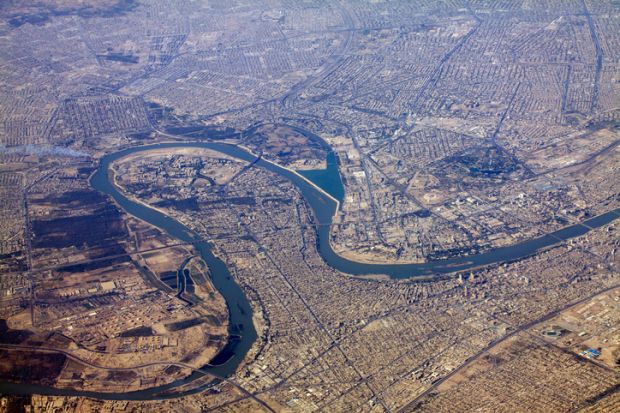Earlier this month, I became the first UK university vice-chancellor to visit Baghdad since the 2003 invasion of Iraq.
The meeting was at the request of the minister of higher education and scientific research, who wanted to know more about the work that we are doing in the south of the country with our partner of five years, the University of Babylon. Developed initially by one of our computer science staff who is an Iraqi national, the relationship has proved a great success. In 2015, the University of Northampton graduated several dozen Iraqi computer science students in the company of Babylon staff and Iraqi diplomats from London. Another cohort will graduate this year.
The visit was not, however, my first time there. In 2014, I spent a week in Erbil, the Kurdish regional capital. The purpose was to see some of the work being done in refugee camps by staff from our education department in collaboration with Unicef. That was in January. By summer 2014, Da’esh (or Isis) had made its deadly advance and all bets were off. But things move on, and in January this year I spent time at Babylon and the region around Najaf. It was during this visit that we arranged the trip to the ministry.
Iraq is still recovering from the invasion, with growth hampered by the low price of oil and the continuing insurgency. Both are preventing the expansion of higher education needed to plug the skills and innovation gap. Despite this, Iraqi institutions are holding their own, with the universities of Babylon, Baghdad and Al-Nahrain among some of the top performers in the Arab world, according to some world rankings.
Al-Nahrain gives a taste of what it was like to work in the sector under Saddam Hussein. The university was set up in 1987 on land owned by the University of Baghdad. Saddam annexed the land and then, to staff the completed buildings, he simply ordered top-ranked academics in science and engineering from across the country to relocate there. Refusal was not an option. Most academics I spoke to think that university life has improved markedly in recent years as the sector strives to re-establish itself with help from international partners.
There are 22 public universities in Iraq where the government, via the Ministry for Education, pays for the running of courses and staff costs. But as financial pressure mounts, so has the growth in private universities, with fees paid directly by students. There are two modes of study in Iraq: morning students, whose entry grades exceed an official threshold, meaning that they qualify for state support; and evening students, who do not. The latter comprise a potentially large market that the private sector is being encouraged to tap. State universities run a mixed economy teaching both modes, with evening students providing an additional source of revenue.
People are understandably interested in the security situation the country and how we handle it. Our perceptions about Iraq are based inevitably on news reports of the fighting in Mosul and previous conflicts. However, most of the country is relatively stable.
The 12km drive from Baghdad International Airport to the secure Green Zone, the diplomatic and administrative heart of the city, was once notorious as the most dangerous road on earth. Named Route Irish by the Americans in the years following the invasion, convoys were at the mercy of improvised explosive devices (IEDs), drive-by shootings, car bombs, rocket-propelled grenades and all manner of suicide attacks. But things have changed since the US withdrawal, and I left with the impression that most Iraqis are simply going about their daily business.
Clearly it would be foolish for Westerners to turn up without official support from the authorities that includes security provision. Kidnap remains a threat, with government-related employees high-value targets. Despite this, insurance cover is available for most areas of the country, and our UK staff are trained to work in hostile environments. As long as you are sensible and take adequate precautions, the risk is manageable.
That said, my forays have not been without consequence. In March this year I fell foul of Donald Trump’s travel restrictions from Middle Eastern countries that included Iraq. On a trip to Miami, I was pulled out of the immigration queue by Homeland Security, held for five hours and questioned twice about why I had been to “Syria”. My UK ESTA travel authorisation was revoked and replaced by a temporary visa, probably because more paperwork was needed to kick me out than let me in. Whether I’ll be allowed back into the US any time soon is yet to be resolved.
But this won’t stop my travelling to Iraq again. Our rationale for working there and in other challenging territories is simple. Our mission requires it, and frankly the Iraqi people deserve our support given the UK’s historically interventionist stance. One area that we intend to focus on more with our Iraqi partners is healthcare. Another is MBA provision. There are also research opportunities that include exchange visits between staff and students.
Iraq is a country of promise and wonder. Its history is sublime and, despite difficult times, a bright future may yet be assured. It’s right and proper that bold universities offer the hand of friendship.
Nick Petford is vice-chancellor of the University of Northampton.
Register to continue
Why register?
- Registration is free and only takes a moment
- Once registered, you can read 3 articles a month
- Sign up for our newsletter
Subscribe
Or subscribe for unlimited access to:
- Unlimited access to news, views, insights & reviews
- Digital editions
- Digital access to THE’s university and college rankings analysis
Already registered or a current subscriber? Login





